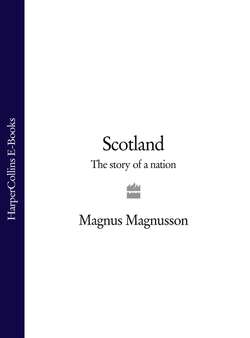Читать книгу Scotland: The Story of a Nation - Magnus Magnusson - Страница 24
The ‘Scots’
ОглавлениеThe people the Romans called Scoti originally came from Ireland. The name was just a term of opprobrium applied by the Roman authors to describe raiders from Ireland, and probably meant, simply, ‘pirates’; it differentiated the Scoti from the Picti of mainland Scotland. The Scoti had raided in the Hebrides and the western mainland of Scotland, they had taken part in the ‘Barbarian Conspiracy’ which overran the Roman province of Britannia in 367 (see Chapter 2), and they had probably been coming across the North Channel to settle in the west of Scotland for quite a long time. Around the year 500, however, tradition suggests that there was a positive ‘migration’ of the Scoti to Scotland: the seventh-century Irish Senchus fer nAlban (‘Tradition of the Men of Scotland’) records the story that the Scoti, under their king Fergus Mór mac Eirc, an enterprising hero in the legendary mould, moved in strength from Antrim in north-eastern Ireland across the North Channel to the rugged, mountainous, island-haunted terrain of Argyll in the west of Scotland. These people were known as the Dál Riata; they spoke Gaelic, and established a new kingdom in the territory of modern Argyll which came to be known as Dalriada.1
The Gaelic-speaking Dál Riata in Argyll and the adjacent Inner Hebrides soon started to colonise farther afield. By the end of the sixth century they were hammering at the boundaries of neighbouring states, led by a series of aggressive warrior kings. One of those whose names are writ large in the Annal of Scotland was Áedán mac Gabhráin, overlord of Dalriada from 574 to 603, whose recorded exploits included large-scale raids by land and sea against the territories of the Picts, the Britons of Strathclyde and the Anglians of Northumbria. He was eventually defeated and killed by the Northumbrians in 603.
